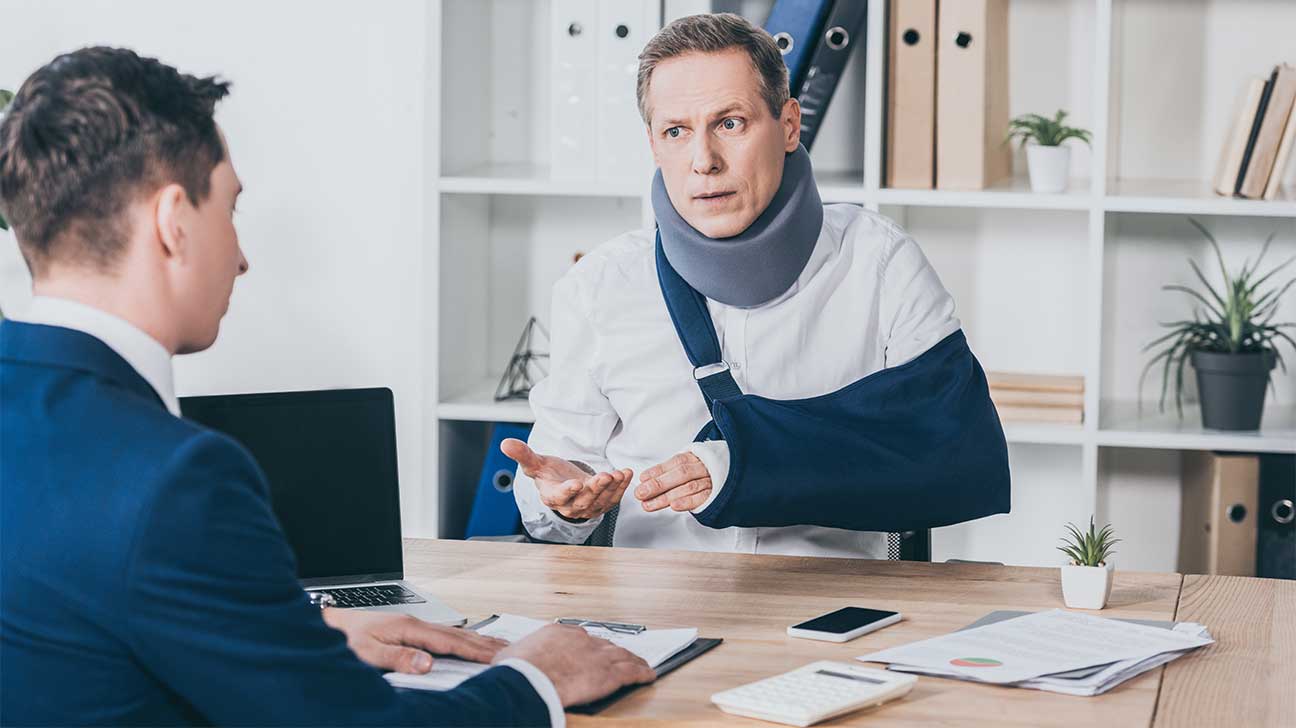If someone gets hurt because of someone else’s carelessness, they might get money from a personal injury case. This money is called “damages.” Damages are meant to help the injured person get back to their life before the accident. It includes money for healthcare costs, lost earnings, and pain and suffering. Figuring out how much money someone should get in a personal injury case is hard. It needs a lot of research and legal know-how.
In every personal injury case, it’s vital to figure out the losses of the hurt person. This could be from medical bills, not being able to work, or how their life has been affected. There are many types of personal injury cases, from car crashes to medical errors and even slipping and falling. Good personal injury lawyers are essential. They work to make sure their clients get all the money they should.
Deciding how much money is fair in a personal injury case means really looking at what happened, how bad the injuries were, and what life’s going to be like afterward. Every case is different. Whether it’s from a bad product or someone getting seriously hurt, knowing the law and having a strong team is key. This helps personal injury attorneys to fight for what their clients deserve.
Key Takeaways
- Figuring out damages is complex and needs lots of digging and legal skills.
- Personal injury cases can happen in many ways, from car crashes to work accidents.
- Good lawyers help by making sure their clients are compensated fully.
- Deciding how much money means looking at medical costs, lost work, and life changes.
- From wrongful deaths to product issues, each personal injury case has unique problems needing special knowledge.
Introduction
Personal injury cases are very important. In 2016, the U.S. saw 95,000 deaths and 9.45 million injuries. This caused $11 billion in losses. These events can devastate families, especially those with lower incomes. So, getting economic help is crucial for their recovery.
Significance of Personal Injury Cases
Personal injury cases matter a lot. They can change lives, affecting people, their families, and the places they live. It’s crucial for those hurt to get fair pay. This money covers their medical costs, lost incomes, and other damages. It helps them piece their lives back together.
Role of Lawyers in Representing Injured Parties
Lawyers play a key role in personal injury cases. They are like guardians, tasked with the ethical and legal work to move these cases forward. Their goal is to ease their clients’ struggles and secure the full compensation these injured folks deserve.
Importance of Fair Settlement
Getting a fair settlement is vital. For those injured, justice delayed can feel like justice denied. Skilled lawyers aim to secure offers that truly make up for their clients’ losses. They know that a swift end to the legal process can deeply help those affected and their loved ones.
Preparation for Evaluation and Settlement
Getting your case ready right is key for a good settlement. Most personal injury cases end in settlement talks, even before lawyers step in. But, knowing your stuff for court helps you set a fair value for your claim.
Thorough Case Preparation
Being known for getting every detail right is a must for injury lawyers. They check all the angles, making sure their case is solid. This helps them talk strong in negotiations with the other side.
Building Reputation for Trial Readiness
If a lawyer is seen as ready for trial, it tips things in their favor. The other side may offer more because they respect the lawyer’s dedication. They figure this lawyer won’t back down from a real fight for their client’s rights.
Investigation of Facts
Looking into the facts of a case is vital to see if it’s strong and what it might be worth. A good look at the law and case details is a must. Injuries differ, so we can’t assume anything. Getting all facts straight before law talk is key. A court needs solid facts to give a fair decision.
Prompt and Comprehensive Fact-Finding
Lawyers dive into finding facts right after an incident. They gather evidence like videos, photos, and what witnesses say to support the case. Sometimes, they might use private investigators or their own tools to find important evidence.
Preliminary Legal Research
Doing legal research is key. In complex cases, lawyers check similar court cases to find out who’s at fault. Figuring out who’s to blame is crucial.
Fact Investigation Techniques Purpose Preservation Letters To ensure crucial evidence, like 911 call recordings, are kept since they might be deleted after six months. Discovery Requests To first gather lots of info, then focus on the most important pieces as they learn more. Form Interrogatories To find out if the defendant was working for someone else during the incident, which could mean there are more people responsible. Requests for Admission To have the opposing side say what’s true, what’s false, or what they don’t know; if they don’t know, they have to check and provide the right information. Document Requests To ask for specific documents in a clear way, as the law requires to avoid confusion. Inspection Demands Allowing one side to check the other’s property closely, noting exactly what they want to see or test, if needed.
Establishing Liability
Figuring out who’s responsible is key in personal injury cases. The lawyer for the injured person must carefully look into what happened. They’re checking if the other party’s mistakes or bad choices led to the injuries. Knowing who’s at fault helps determine the right compensation and reach a just agreement.
In Florida, proving someone’s negligence is easier in civil court than criminal court. A defendant can be blamed if it’s more likely than not that they caused harm. This means the evidence just has to tip a little towards the injured person’s side, about 51%. In Florida, you can still get some money if you were partly to blame, as long as you weren’t over 50% at fault.
The attorneys at Osborne & Francis have a strong track record in helping the injured. They work hard to get fair deals covering medical bills, lost wages, and more. They’re known for getting cases ready with great care and being ready for trial. This approach helps them win better settlements for their clients.
If you get hurt in New York State, being a bit responsible might reduce your compensation. However, if you’re only a bit to blame, you can still win most of your case. And sometimes, someone else might be held fully to blame because of their relationship to the person who caused the accident.
Having a good video can really strengthen your case in court. This was true in a case where a video helped win a large settlement for a family who lost someone in a pedestrian accident. How the trial is set up can also make a big difference. Things like whether the case deals with fault and compensation at the same time can impact the final ruling.
Key Considerations in Establishing Liability Examples Defendant’s Negligence – Florida’s lower burden of proof in civil cases
– Comparative negligence statutes in Florida and New YorkFault Assessment – Osborne & Francis’ aggressive litigation approach
– Jury award with 10% plaintiff fault in New YorkLiability Determination – Vicarious liability and strict liability cases
– Video evidence proving liability
Figuring out who’s to blame is vital in personal injury claims. Attorneys who really dig into the evidence, know the law well, and fight hard for their clients are essential. Teams like the one at Osborne & Francis prove key in getting fair outcomes.
Calculating Damages
In a personal injury case, figuring out damages needs a close look at different parts. This includes special damages, medical special damages, and general damages.
Special Damages
Special damages are cost you can touch or count clearly. This includes things like repairing your car, the salary you lost because you couldn’t work, and other expenses. They are easy to prove and clearly show what you should be paid back for.
Medical Special Damages
Medical special damages are the full cost of the medical treatment. This includes what the insurance didn’t cover. This makes sure the injured person doesn’t pay for any part of their healthcare themselves.
General Damages
General damages are for the pain and unhappiness the injury caused. You can’t put an exact value on these. But, we usually measure them by how much the special damages were – from 1.5 to 5 times that amount. In really bad cases, this can even be more than 5 times.
They decide this multiplier based on the medical special damages. Smaller injuries get smaller multipliers, typical injuries range from 1.5 to 5 times the medical special damages. They also think about how bad the injury was, how much pain it caused, how long it took to recover, and how much it messed up the injured person’s life.
When a case goes to court, the jury might pick the final damage amount. They look at how good the witnesses were. And, how powerful the story of the accident or injury is.
Compensatory Damages
In personal injury cases, compensatory damages help compensate the injured person for their losses. They are split into two key types: economic and non-economic damages. It’s important to know the difference between these to accurately assess a personal injury’s worth.
Economic Damages
Known as special damages, economic damages handle the direct financial losses from injuries. These losses include medical bills, both past and future, and lost earnings, from recovery time and thereafter. The injured can also get money for lost earning potential caused by their injuries. The future medical costs are based on what the patient will likely need for the rest of their life.
Non-Economic Damages
Non-economic damages cover the personal, less direct losses, like pain and suffering. They include physical pain, emotional suffering, mental stress, and the loss of life enjoyment. These damages are harder to figure because they involve more subjective measures, often using special calculations or multipliers.
Knowing the difference between economic and non-economic damages helps injury lawyers fight for their clients’ full compensation. This includes everything from actual bills to how the injury has impacted their lives emotionally.
Punitive Damages
Personal injury cases might award punitive damages too, apart from compensatory ones. These are also called exemplary damages. If the defendant acted extremely wrong on purpose, punitive damages punish them. They aim to stop others from doing the same bad thing again. Georgia law usually won’t let these damages go over $250,000.
When deciding on these damages, the jury looks at how bad the defendant’s actions were. They also check if making the defendant pay a lot will make them think twice. Then, they think about how much damage the plaintiff suffered. States have different rules, like how much these damages can be compared to the defendant’s wealth. The Supreme Court says punitive damages can be up to four times the regular damages. Going over that could be too much and not allowed by the law.
Punitive damages aren’t just for big companies. They may be given if someone drinks and drives or breaks laws against discrimination at work. Those who want to change tort laws think these damages should only apply in cases of real bad intent. But, they’re often given for very bad behavior, even if the intent wasn’t clearly bad.
Personal Injury
There are many ways someone can get hurt. This includes car crashes, mistakes by doctors, falls, work accidents, bad products, and deaths that shouldn’t have happened. These accidents can cause small to life-changing injuries. They affect the person’s body, feelings, and money.
Types of Personal Injury Cases
In Utah, people can get hurt in various ways. This might be through car accidents, dog attacks, harm in nursing homes, slips, and work incidents. The goal of these cases is to help those hurt by someone else’s carelessness or on purpose.
Common Injuries and Impacts
In Utah, severe injuries like head trauma, damage to the spine, losing limbs, or bad burns are not rare. It’s vital to know how bad these injuries are. This helps figure out what help the injured person needs. This can cover doctor’s visits, therapy, missed work pay, pain and suffering, and broken things.
Consulting Verdicts and Settlements
When looking into a personal injury case’s possible value, you should study past jury awards and settlement amounts. These numbers are a good place to begin. But remember, juries can be hard to predict. Many other things can also affect the end result.
A smart personal injury lawyer will use past cases as a guide. They’ll also look at the specifics of each case. This helps them come up with a fair settlement value.
Brach Eichler Injury Lawyers have won over $425 million for their clients. Some big wins include:
Case Type Settlement Amount Details Vehicle Accidents $6 Million For a young man from Brooklyn struck by an ambulance Vehicle Accidents $25,000 For a 73-year-old pedestrian hit by a car Vehicle Accidents $875,000 For a Bronx man struck by a truck leading to amputations Premises Liability $3.9 Million For a New York City detective who fell due to a slope sidewalk Premises Liability $108,000 For an 81-year-old woman fracturing her elbow Premises Liability $800,000 For various injuries due to building negligence Medical Malpractice $46 Million For a college student suffering hypoxic brain injury Medical Malpractice $27.5 Million For an 8-month-old child with severe brain damage Medical Malpractice $46 Million For multiple cases resulting in brain injuries
These wins offer insight into the values of settlements and jury awards for different types of personal injury cases. But remember, many things can change the outcome. This includes each case’s unique details and the jury’s decision-making process.
Negotiation Tactics
Good negotiations start with being well-prepared and being open to going to trial. If a lawyer is prepared for trial and the facts are all lined up, the other side is more likely to give a fair deal. This way, everyone has an incentive to settle fairly.
Reputation and Preparedness
Being known for getting all the facts right and being ready to go to court is key. Opponents, seeing that a lawyer is ready for court, may offer a better deal. This is because they want to avoid higher costs if they lose in front of a jury. This reputation can really help a lawyer during negotiations.
Reasonable Settlement Offers
It’s important for the plaintiff’s attorney to find the right balance. They push for the most money while also being willing to meet in the middle. Assessing the case’s strengths and weaknesses helps them decide when to settle or keep negotiating. Their main goal is to achieve the best result for their client, either by settling well or by winning in court if needed.
Factoring Jury Awards
Examining jury awards in injury cases involves exploring jury unpredictability. While looking at past cases can help, juries can be moved by unseen intangible factors. Things like how witnesses perform and if the jury feels for the defendant play big roles. The very nature of the accident or injury can also sway their decision.
Skilled injury lawyers must consider these unknowns. They base a case’s worth on injury seriousness, the evidence strength, but also on how juries might react to these intangible factors. This mix can make it tough to set a solid prediction.
Learning about the intricacies of jury awards is key for personal injury attorneys. With this understanding, lawyers can guide settlement talks better. Their goal is to secure the best compensation for their clients in the legal system’s up-and-down world.
Conclusion
Figuring out damages in a personal injury case is hard. It involves deep research and legal knowledge. It looks at many things. Like, how much money is needed for medical care, lost work pay, and the pain felt. Getting the right amount is key for a fair settlement. The plaintiff’s lawyer playing a big role. They need to be skilled in making the case and ready to go to trial if needed.
Looking at old case outcomes helps, but it’s not always exact. This is because what a jury decides can swing and there are unseen forces at play. This makes guessing the worth of a personal injury case tough. Personal injury attorneys are crucial in this situation. They use their know-how to make sure the injured get the most compensation they can.
When it comes down to it, resolving a personal injury case well is a full-on effort. It must consider each claim’s unique parts, how strong the proof is, and the risks and gains of going to trial. With the right legal team, injured folks get a shot at a good outcome. And they can get the money they need to keep going.
FAQ
What is the role of a personal injury attorney in evaluating damages and negotiating a fair settlement?
Personal injury attorneys help injured people get the money they deserve. They look into the case, figure out who’s at fault, and calculate what the injured person should be paid. This includes medical costs, lost earnings, and the pain endured.
How do personal injury cases impact individuals and families?
Personal injury cases can be life-changing. For example, in 2016, over 95,000 people died, many more got hurt, and it cost over $11 billion. These events can seriously harm families, especially those with lower incomes.
Why is proper case preparation essential for evaluating and negotiating a fair settlement?
Getting ready for trial well is key. It makes sure the lawyer knows the law and case facts to get a good settlement. Also, prepping carefully shows the other side the case is serious, which can lead to better offers.
What steps are involved in the investigation and evaluation of a personal injury case?
It’s critical to quickly and thoroughly look into the case. This helps know if the case is strong and how much it could be worth. The investigation includes studying the law and digging up the facts. And, proving who is responsible is crucial for the case’s value.
How are damages calculated in a personal injury case?
To work out damages, you find the money that was spent (like medical bills), what was lost (like wages), and add in for pain and suffering. Then, you use formulas to set a fair amount. This process looks at all the different costs and harms.
What are the different types of compensatory damages in personal injury cases?
In injury cases, there are two main types of compensatory damages. Economic covers money lost and costs spent like medical bills. Non-economic helps with the pain and suffering that doesn’t have a set price.
When can punitive damages be awarded in personal injury cases?
On top of compensatory damages, the law may allow for extra punitive damages. These are for cases where the defendant’s actions were especially bad. In Georgia, these extra damages are usually capped at $250,000, but there are exceptions.
What types of personal injury cases can arise, and how do the injuries impact the victims?
Incidents like car crashes, mistakes in health care, slipping, and more can lead to personal injury cases. These cases can cause anything from minor injuries to big ones. They affect people in how they feel, what they can do, and how they manage financially.
How do attorneys use past jury awards and settlements to evaluate the potential value of a personal injury case?
Looking at what other cases got helps guess what a new case might be worth. But, since every case is unique, these comparisons aren’t perfect. Good lawyers combine this data with details from the current case to figure out a fair amount.
What are the key tactics for effective settlement negotiations in personal injury cases?
Successful negotiation needs a lawyer who’s ready for either a settlement or a trial. They should push for a good offer while still being ready to talk and find common ground. This approach means getting the best deal for their client.



